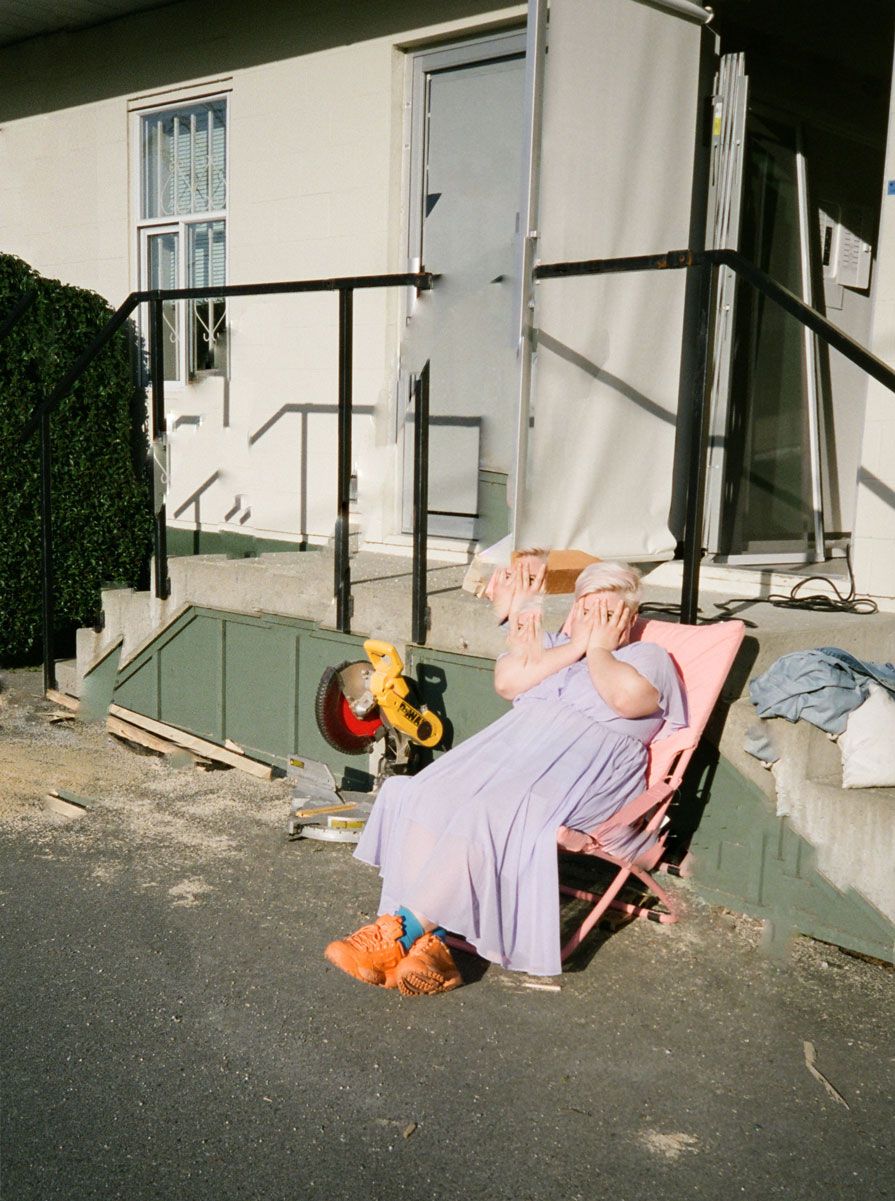Victoria based musician Celina enjoys the freedom of working alone. She’s been playing in bands since she was 17, but her solo project, future star, provides an invigorating degree of creative control.
“There’s something very powerful to me about writing songs on my own,” she tells me as we chat over Zoom. This profound sense of creative liberty is evident in Celina’s latest album, When Will The DJ Of Luv Grant Me My 1 Request, which, ironically, is all about her desire to not be alone. However, she adds, “While I definitely value my independence within songwriting, the fact is this album could not exist without the help of my friends and my community.”
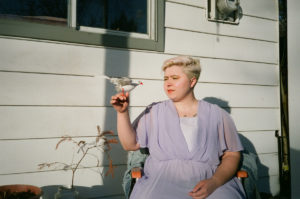
The songs on DJ of Luv sound like pages torn out of Celina’s diary, each one musing on distinct but universal experiences — the struggle to let go of a relationship that isn’t meant to be, the dreaminess of having a crush, and the frustration when that perfect dream doesn’t quite translate into reality.
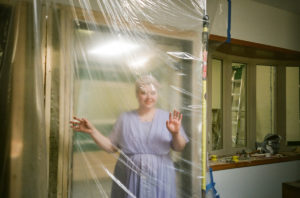
In the album’s 22 minute run time, Celina manages to present an honest and multifaceted self-portrait. She’s self-conscious in the same breath as she’s self-assured. Independent without ever denying her desire for connection. She not only allows herself to express dramatic, over-the-top emotions in her music, but embraces it as an act of self-care. Even when these big emotions are on the pessimistic side, deep down, she’s still hopeful. For Celina, “future star is the idea of potentiality.”
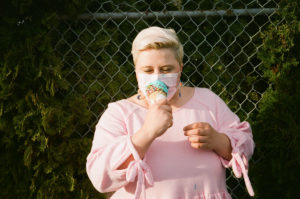
Peyton Murphy: One thing I really like about DJ of Luv is that it seems less to be about yearning for a particular person, and more about yearning for love and connection in general. Is that a distinction that you had in mind when making the album?
Celina: I feel like that’s just how it was for a long time. The first half of the album was released as a demo EP, and then I re-recorded it for the album. So the first half of the album is all about the post breakup period, figuring out: “how do I exist without this part of my identity that’s attached to another person?” Or like, “how do I go on without that connection in my life? What the heck is going on? And why!?” So, the first half is just me moving through that. The second half of the album is me being like, “now what? I’m ready. Someone kiss me!” And there are definitely specific people who show up on the album. I would move through each of those crushes, and then be like, “okay that didn’t work out. Now what? I’m so ready to fall in love, I’m so ready to have something really beautiful.” I feel like this album was this magic spell that I was throwing out into the universe being like, “okay, it’s all out there now.” But now I met my partner and it’s been great!
Peyton Murphy: When you say the album was like a “magic spell,” that reminds me of what I got from the title of the album. I think the “DJ of Luv” is a good analogy for the lack of control, or lack of luck that we feel when it comes to our love lives. The idea of a “DJ of Luv” sort of suggests that the fate of love is out of our hands.
Celina: I feel like this album is one of complaint and frustration, but also a hopefulness and optimism. Like, okay, I’m optimistic, but when do I get what I want? Whenever I have a really big crush, I kind of relinquish control and responsibility. But what this album ended up being was an expression of: “I’m over that. I’m over not doing something about it. I want to do something about it now.” I finally got to a place where I was like, “I’m so ready for this. I’m going to tell everyone I have a crush on that I have a crush on them, and something’s got to work out, right?” And it just didn’t, it just kept not happening. There’s a dialectic of wanting control, and also wanting to be out of control.
Peyton Murphy: In one track on the album, “It’s Hard to Let Go of You,” you talk about how you’re in a relationship that’s not exactly flourishing, but you’re like, “let’s just keep going because it’s comfortable,” which I think is a situation lot of people can relate to.
Celina: In “It’s Hard to Let Go of You,” I say “we have similar goals.” When really, we didn’t have similar goals at all, we had totally different goals. But the whole song is just me being like, “you just don’t realize that we can make it work.” And that’s a pattern that I got stuck in — forever being like, “things will change. This person will realize what they really want.” But they knew what they wanted, and it was not the same thing I wanted.
Peyton Murphy: I can definitely relate to that! It’s sort of a “love conquers all” mentality, right? When you’re in a relationship, you’re like, “external circumstances don’t matter, because we love each other.”
Celina: Yeah, practical things don’t matter, because you’re like, “we love each other, and that’s what’s most important.” My relationship prior to the one that inspired “It’s Hard to Let Go of You” was with someone who didn’t really like me very much. They had been mean to me. So being in a relationship with someone who was nice to me, and who said they loved me on a regular basis, I was like, “okay, this is way better.” Because the alternative is much worse. I think it’s easy to get stuck in the mindset of: “the only thing that exists is something you’ve already experienced,” when actually, you don’t even know what’s coming next. And that’s kind of cool. The best thing that’s happened to you hasn’t happened yet.
Peyton Murphy: Your album touches a lot on the simple, innate desire for connection. I know that you said your life hasn’t changed dramatically due to the pandemic, but do you think the pandemic has changed the way you view intimacy or the importance you place on it? Or even what you define as intimacy?
Celina: I never consider myself to be a very touchy-feely person, like, I’m not a hugger. It’s not that I’m not a warm person, but in my mind I can do without physical touch. But then it was all those little things, those little moments of genuine physical affection, that I missed a lot. ” It makes me appreciate that I found a relationship in the midst of the pandemic, even though my partner doesn’t live in Victoria. That’s a little stressful.
Peyton Murphy: The lyrics on the album are very candid and very honest. Do you ever have any reservations when it comes to putting such personal lyrics out there? Or does it just feel natural?
Celina: I don’t really feel nervous. I feel like there’s nothing on the album that I wouldn’t say to someone’s face. I think writing music for me is a self care practice — I couldn’t write music if it wasn’t personal.
Peyton Murphy: I feel like, generally, when being vulnerable or addressing insecurities, a lot of people have a tendency to hide behind irony or self deprecation. Is that something that you consciously try to avoid in your music? Because I feel you’ve found good balance between being able to poke fun at yourself, while still having a lot of respect for your own emotions and feelings.
Celina: That’s really sweet. I don’t think it’s cool to talk down to yourself, but also, I don’t think it’s cool to take yourself too seriously. Your feelings are valid, but they’re not necessarily real. Your feelings are valid, but it doesn’t mean that they mean anything. That’s just how you feel. That’s all it means. That’s what I love about feelings. I feel like there’s definitely a lot of discussion about how, “your feelings are valid, and therefore, that’s the truth.” Like, it’s important to respect yourself, but that doesn’t mean that other people have to like you. You can only control what you can control. And so you might as well treat yourself nice! Respect yourself, because no one else has to. Anyone can disagree with you, and that’s fine. For me, being super dramatic is part of a transformation process. When I say music is self care, I mean it’s like this process of transforming something that feels really uncomfortable into something that’s actually manageable. And part of that transformation process often is poking a bit of fun at myself.
Peyton Murphy: Yeah, when you put big feelings down on paper, I definitely think things get brought back down to earth. And then you’re just like, “oh, wait a second, maybe this isn’t the end of the world.”
Celina: And for some songs, it’s more of a moment of celebration. For example, a song like “X-Ray Spex” where I’m like, “wow, I feel a real, beautiful thing for this person.” It’s really big and beautiful, and I’m allowed to celebrate that for a second. I don’t have to necessarily rein it in for this song. In the real world, I might have to rein it in a bit. But in a song, I can say whatever I want. I feel like songwriting is an arena to play things out that you maybe couldn’t or shouldn’t do in real life, and to make it into something beautiful. Make it into something that’s not just for you anymore. That’s for other people.
Peyton Murphy: That definitely goes along with the closing track of your album, “Tell a Story.” It seems like it’s very important to you to place the events of your life into a sort of narrative.
Celina: I think a lot about meaning making with my creativity. I think a lot about, “what is the point of art?” For me, specifically, art is about creating meaning out of meaningless experiences. Because for most experiences, unless you make it into a bigger deal than it is, and unless you intentionally make meaning out of it, that experience can just disappear. Do you know how many crushes that I’ve had that I’ve never written a song about? That I don’t even remember anymore? It’s a conscious choice to turn something into a story. I’m gonna bring it all back to my good friend Alie. She wrote a song called “Stories We Tell Ourselves About Ourselves.” I think about that phrase a lot. Like, what story are you telling yourself about yourself? How do you create meaning out of your own existence? How do you create the relationship you have with another person? That’s the point of creating and being human. We have this unique ability to create narratives and to tell stories about ourselves and make our life a little bit more meaningful. Feelings are valid, and not a moot point, but if you write a story about how you feel, then it becomes something bigger. How do we make our lives a little more special? How do we make other people’s lives a little more special? It’s all the little things. The artistry of life — it’s not the only aspect of life, but I think that the artistry of living is something to aspire to.
Peyton Murphy: That’s a beautiful perspective. You’ve mentioned a few times that you ended up meeting your partner after you completed the album. I was wondering, now that you know meeting them was just around the corner, what would you say to your past self who was making this album?
Celina: Patience. The most frustrated and angry song on the album is “Judgment Card.” It’s about me repeatedly, repeatedly, doing tarot readings on myself, always playing the judgment card being like, “you’re gonna get what you deserve girl, you just need to wait!” And it’s not that nobody told me what I needed to know, which was: “be patient and wait.” I think that even if I told myself to have patience, even if I appeared to myself in the past, I would simply ignore myself. There’s not much you can tell me — that’s the moral of the story. It’s hard to tell me what to do. I’m just gonna keep on feeling.
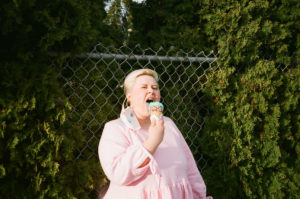
When Will The DJ of Luv Grant Me My 1 Request was released by Kingfisher Bluez, produced by Tom Whalen and recorded by Julian Marrs. It features album art by Marita Michaelis and Lauren Ray.


